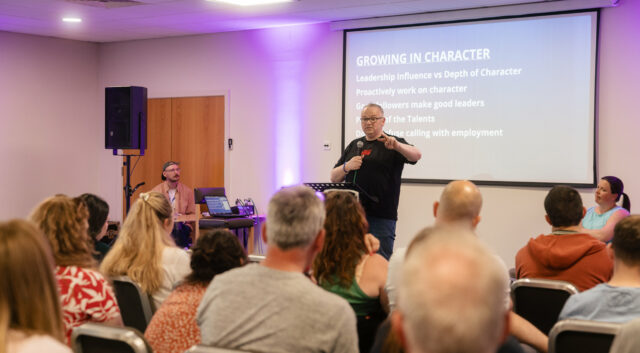John Mumford looks at the dangers of hero worship, competing and comparing in the church.
What, after all, is Apollos? And what is Paul? Only servants, through whom you came to believe – as the Lord has assigned to each his task. I planted the seed, Apollos watered it, but God made it grow. The man who plants nor he who waters is anything, but only God, who makes things grow. The man who plants and the man who waters have one purpose, and each will be rewarded according to his own labour. For we are God’s fellow workers. 1 Corinthians 3
When, on our honeymoon in Italy, Eleanor and I first saw Michelangelo’s famous marble statue of David, we talked far more about the brilliance of the sculptor, than ever we did the quality of his chisel. If you see gifts being used at their most creative, and to the great effect in people’s lives, you don’t salute the gift, you praise the giver.
Why hero-worship is a mistake
Let me remind you of the background to this letter. The Corinthians insisted on creating heroes and worshipping them even in the church. They are boasting in their individual teachers as though they could “belong” to them in some way. The Ancient Greeks invented the term “hero” and no other culture ever came closer to deifying its great men. In this letter, Paul is determined to prove that hero-worship, fan clubs and subsequent factions have no place in the church. Paul had planted the church, and so was a hero to many. Apollos came along as an astounding teacher and impressed others. The fact is that there is only room for one hero.
hero-worship, fan clubs and subsequent factions have no place in the church
And to put Christian leaders or celebrities on a pedestal is in fact, Paul would argue, a mark of immaturity.
This passage is all about the sovereignty of God. He is the one who gives gifts as he chooses. He is the one behind any success we might have. And “the Lord has assigned to each his task.” In growing churches, there are a lot of different functions. There are no stereotypes; we’re free to be ourselves in the service of God. The truth is, not all of us are church-planters like Paul, eloquent teachers like Apollos, open-air preachers like Peter. To pretend otherwise is simply to invite our insecurities to have free reign. We’re all different, in how we’re made, how we’re gifted, what we do well. But Paul’s point is we’re all equal. “So neither he who plants nor he who waters is anything, but only God, who makes things grow.”
The dangers of competing and comparing
The first danger is Competitiveness. Having too low a view of other people. Thinking that our giftings far outweigh theirs. For example, the Corinthians prided themselves in their superior intelligence. And this made them look down on others. Competitiveness leads us to seeing ourselves in the wrong way. Seeing our various gifts and differences as conflicting with rather than complementing one another. We end up devaluing and underrating the contribution of others, be it to a housegroup, a band, a discussion-group, a bible study, an office. But at a stroke, Paul outlaws such rivalry. It’s unhealthy. It damages people. It forgets the fact that God has given these gifts in the first place.
Comparative thinking is always, according to the bible, stupid.
The second danger is a more common one: Comparisons. Having too low a view of yourself. When you compare yourself with other people, it usually leads to the feelings of inferiority which Paul identifies later in the same chapter, “If the foot should say, ‘Because I am not the hand, I do no belong?” Or “If the ear should say, ‘because I am not an eye, I do not belong to the body?” Comparative thinking is always, according to the bible, stupid. “When they compare themselves with themselves, they are not wise.” I might be tempted to say of myself that I’m not God’s greatest gift to the world of music. I don’t have a rhythmical bone in my body, or any ability to hold a tune. I have to watch other people to know when to clap. Say I compared myself with Brenton Brown or Marc James (who would be generally acknowledged as competent worship leaders and musicians) I could end up feeling inferior.
Vive la Difference!
It’s fascinating to me what these different parts of the body compare themselves with. The ear compares itself with the eye, not with the hand or the stomach! And the foot compares itself with the hand, not with the head! The hand is just a little bit better, more prominent, more visible, just a little bit more glamorous. The point is we tend to compare ourselves with people who are like us, rather than people who are very different. Joking apart, I’m more likely to compare myself to another senior pastor than a brilliant musician! In the church, we identify one person who is quite like us (they’re interested in the same sort of things or they’re gifted in the same sort of areas), but then we compare ourselves. We worry that they are a bit better than us, a little more prominent, just a little bit more glamorous. And the comparison then makes us feel bad, makes us feel we don’t belong, makes us not even want to stay. Paul says, “You’ve got to get rid of all that kind of comparative thinking.” That’s the very last thing they want!
Sometimes churches can make people feel as if they don’t belong. How? By requiring everyone to function in the same uniform way. By trying to smash square pegs into round holes. By saying either overtly or subtly “the only kind of people we want in this church movement are people who are like this, people with a certain kind of temperament, with a certain cluster of gifts.” Or we say “The only people we accept in this church are those who are really good at articulating doctrine, or those who are super-extrovert. The rest of you we don’t really like!” We need to be a church that doesn’t try to squash everybody into a one-size-fits-all. We need to remember that “God has arranged the mosaic.” As Paul says, “God has arranged the parts in the body, every one of them just as he wanted them to be.” The cure for “I don’t belong” is the understanding that God has arranged the parts of the body, every one of them, just as he has determined. There is room for everybody.









